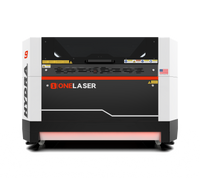Laser cutting plywood has become a favorite among makers, small businesses, and hobbyists who want to create precise, clean, and professional-looking wooden designs. From intricate wall décor to custom coasters, a good laser cutter can turn ordinary plywood into extraordinary art.
Key Takeaway
In this guide, you’ll learn how laser cutting plywood works, which machines and plywood types deliver the best results, and what settings to use for different thicknesses. We’ll also explore creative project ideas and answer the most common questions from the OneLaser community.
1. What is Plywood?
To successfully laser cut any material, you must first understand its composition. Plywood is an engineered wood product made from thin layers of wood veneer, known as plies. These plies are peeled from logs and then stacked and glued together, with the grain of each adjacent layer rotated up to 90 degrees.
This alternating grain structure gives plywood its exceptional properties:
- Dimensional Stability: The crisscrossed layers prevent warping and minimize expansion or contraction, which is vital for precise assembly and interlocking designs.
- Consistent Thickness: High-quality plywood offers uniform thickness, ensuring that when you cut plywood with laser cutter, the beam passes through the entire piece without inconsistent results.
The key component to be mindful of is the adhesive. Since the laser uses intense heat to vaporize the wood, the glue holding the plies together is where most problems—both quality and safety—originate.

2. How Laser Cutting/Engraving Plywood Works
When you place plywood for laser cutting into your machine, the laser beam focuses a high concentration of thermal energy onto a tiny spot.
- The Cutting Action: The heat instantly vaporizes the wood fibers and the adhesive along the programmed vector path. This vaporization process creates the kerf, or the width of the material removed by the laser, which allows the cut piece to drop out.
- The Resulting Edge (Charring): Since wood is an organic material, the intense heat leaves a dark, brownish-black residue along the cut line—this is called charring or scorching. Controlling this charring is a major part of optimizing your machine settings.
- Engraving Modes:
Raster Engraving: This uses high speed and lower power to scan across the material, pixel by pixel, burning the surface to create shades and images.

Vector Engraving: This follows a line path, similar to cutting, but at a higher speed and lower power setting to create shallow, precise score lines.

Safety Is Non-Negotiable: Because the cutting process involves vaporization and combustion, Air Assist and ventilation are critical.
Air Assist blasts air directly into the cutting zone to extinguish flames and blow away smoke and debris, resulting in a cleaner cut and preventing dangerous flare-ups.
3. Best Plywood for Laser Cutting and Engraving
Choosing the right plywood for laser cutting can prevent hours of frustration and wasted material. The key is to find material with minimal internal voids (air pockets) and low-toxicity glue.
|
Plywood Type |
Characteristics & Best Use Case |
Glue Safety Note |
|
Birch Plywood |
The Industry Standard. Known for its consistent thickness, fine grain, and high number of thin, uniform layers. Ideal for intricate designs and detailed work. |
Generally uses low-toxicity, water-resistant exterior glue. Highly Recommended. |
|
Poplar Plywood |
Very lightweight and soft. Cuts easily and is excellent for rapid prototyping and large models where weight is a factor. |
Check the glue—often safe, but consistency can vary. |
|
Bamboo Plywood |
Unique look, eco-friendly. It cuts cleanly and leaves a beautiful, contrasting light-brown edge. |
Typically made with safe, modern adhesives. |

The Glue Warning: A Matter of Health and Safety
You must avoid any industrial or cheap construction-grade plywood that contains Urea-Formaldehyde (UF) or Phenol-Formaldehyde (PF) adhesives.
When these glues are heated by the laser, they release highly toxic, noxious fumes that are dangerous to inhale and can quickly corrode your machine’s optics and moving parts.
Always source plywood for laser cutting that is certified for laser use and states it uses non-formaldehyde adhesives.
4. Best Laser Cutters for Plywood: Selecting Your Tool and Optimizing Settings
The best laser cutter for your laser cut plywood project depends entirely on the thickness you need to cut and your budget.
|
Laser Type |
Max Recommended Thickness |
Best For |
|
CO2 Laser Cutter (50W+) |
Up to 18mm plywood (multi-pass) |
High-volume production, thick materials, speed, and clean cuts. |
|
Diode Laser Cutter (10W - 20W) |
Up to 3mm plywood for laser cutting (multi-pass) |
Entry-level projects, engraving, and cutting thinner sheets. |
4.1 Core Parameter Setting Recommendations
Due to variations in machine type (CO2 or Diode), power (W), and plywood density, there is no one-size-fits-all setting. The table below provides a starting point for setting parameters when cutting plywood with laser cutter:
|
Plywood Thickness |
Laser Type |
Power (%) |
Speed (mm/s) |
Passes |
Purpose |
|
3mm Birch |
CO2 (80W+) |
50% - 70% |
15 - 25 |
1 |
Clean, fast cut |
|
3mm Birch |
Diode (10W) |
80% - 100% |
100 - 300 |
3 - 5 |
Clean cut, multiple passes required |
|
6mm Birch |
CO2 (80W+) |
75% - 90% |
5 - 10 |
2 |
Suitable for thicker materials |
|
18mm Birch |
CO2 (100W+) |
90% - 100% |
2 - 5 |
3 - 5 |
Maximum thickness, requires high power |
4.2 Best Plywood for Laser Cutting and Engraving
Not all plywood is laser-friendly. The glue, density, and surface finish all affect cut quality. Here’s what you should look for:
a. Laser-Grade Birch Plywood:
Birch is the most popular plywood for laser cutting. It cuts evenly, engraves beautifully, and has a consistent light tone perfect for engraving contrast.
b. Basswood or Poplar Plywood:
Softer woods that are easy to cut but may have less structural strength.
c. MDF-Core Plywood (with caution):
Some MDF-core sheets cut well, but the resin and glue may emit fumes. Always ensure proper ventilation or use fume extraction systems like OneLaser FumeGuard™.
5. Laser Cut Plywood Projects
Plywood is one of the most versatile materials for laser cutting. Here are some creative and profitable ideas to try with your OneLaser machine:
5.1 Laser Cut Candy Boxes
Create themed candy boxes for holidays or parties. Plywood boxes can be engraved with custom names or logos — ideal for Etsy or gift shop sales.

5.2 Laser Cut Clock
Design modern or rustic wall clocks with layered plywood details. Combine laser engraving and cutting for a 3D look.

5.3 Laser Cut Coaster and Holder
An easy yet elegant product for beginners. Engrave monograms or patterns on coasters and cut a custom stand to hold them.

5.4 Laser Cut Map
Turn city maps or topographic layers into artistic plywood wall pieces. Laser Cut Map is a great for décor and souvenirs.

5.5 Laser Cut Keychain
Cut small wooden keychains using 3mm birch plywood. Personalize them with names or icons.

5.6 Laser Cut Door Hanger
Create “Welcome” or “Do Not Disturb” signs for hotels or homes. Thin plywood hangs well and engraves beautifully.

5.7 Laser Cut Calendar
Make reusable wooden calendars with engraved dates and moveable markers — a perfect office gift.

5.8 Laser Cut Controller Stand
Gamers love custom controller holders. You can cut precise parts from 6mm or 10mm plywood and assemble them easily.

5.9 Laser Cut Wall Décor
Layered art pieces are among the most popular plywood projects. Combine different stain tones for added depth.

5.10 Laser Cut Jewelry Stand
A simple and profitable item for craft fairs. Use 3mm plywood for delicate branches or abstract shapes.

6. Frequently Asked Questions (FAQs)
Q1: Can you cut plywood with a laser cutter?
A: Yes, a laser cutter is perfectly suited for laser cutting plywood. Both CO2 and Diode lasers can be used, with CO2 lasers being more efficient for thicker sheets.
Q2: How thick plywood can a laser cutter cut?
A: The cutting thickness depends on the laser's power. For instance, high-power (100W+) CO2 lasers can cut 18mm plywood, while common desktop Diode lasers are generally limited to between 3mm and 6mm.
Q3: Can you laser cut 18mm plywood?
A: Yes, but it typically requires a high-power CO2 laser cutter and often requires a multi-pass setting to cut cleanly through the material.
Q4: What type of plywood is used for laser cutting?
A: Birch Plywood is the most popular choice due to its uniform layers, lack of voids, and excellent cutting quality. Most importantly, always choose boards made with non-formaldehyde adhesives to ensure safe operation.
Have Questions? Join Our Forum!
Conclusion
Laser cutting plywood unlocks endless possibilities — from hobby projects to full-scale business production. With the right machine and settings, you can achieve clean edges, intricate patterns, and durable wooden creations that sell.
The OneLaser X Series gives creators the perfect start, while the Hydra Series empowers professionals to scale production with industrial precision.
Combine that with U.S.-based R&D support, 3-Year Limited Warranty, financing options, and an active OneLaser community, and you’ll have everything you need to bring your plywood projects to life.

 Liquid error (sections/image-banner line 171): invalid url input
Liquid error (sections/image-banner line 171): invalid url input





